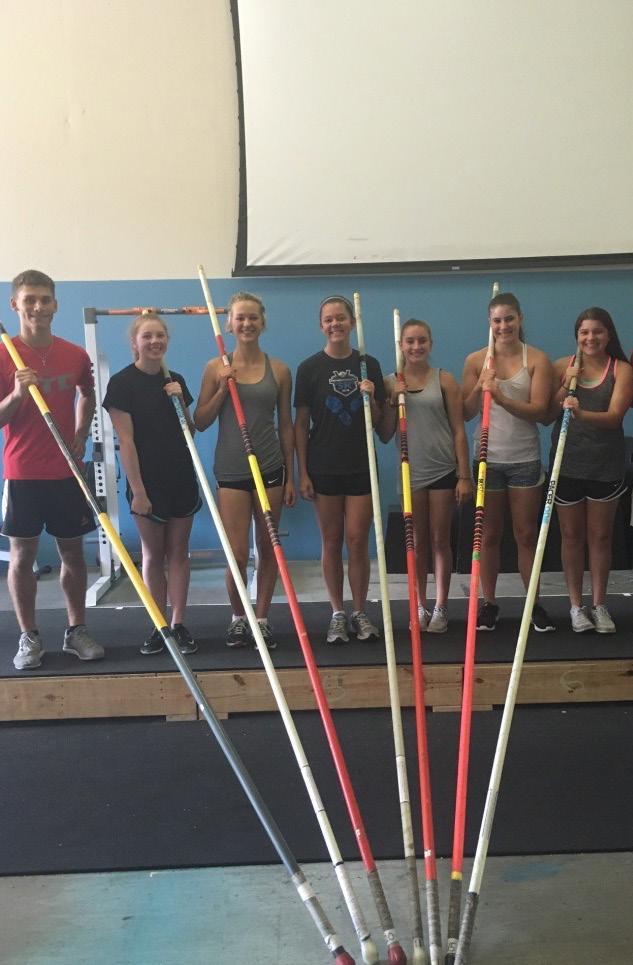
3 minute read
MAKES & MISSES
By Jose R. San Miguel
Every ending - cut from their last team, told they have grown too tall to continue in gymnastics - is a new beginning in track and field.
Advertisement
What’s wrong with being a beginner?
As kids, we attend school and learn from a curriculum. Our minds are open. Some of us get it sooner than others, but for the most part, we all digest the material and move on to the next level. We master basic addition and eventually get to calculus.
We begin careers based on our knowledge and interests, and permit ourselves to be new, to perform with confidence and consistency, and get promoted to more challenging, rewarding roles. If you aspire to be a doctor, you attend medical school after college; do a clinical rotation; become a surgeon, and then a brain surgeon. It is a process, and you trust the process.
It is not always the same in athletics.
As young athletes start in sports, the initial expectation is that they will learn in a fun environment. They mature, and the competitiveness of their sport and society’s expectation kick in. The focus shifts from enjoyment to performance. To wit, to win. Unlike school, in which students are propelled forward toward a degree, in sports many are left behind, physically and emotionally, for not ‘getting it’ fast enough. The emotional side of not catching on quickly can handicap you if you let it. It beats the human spirit and drains the self confidence.
Enter pole vault. Everyone gets to carry a pole, run down the runway and take a jump. There are no bench warmers. Every athlete is afforded the chance to improve, something that is true across track and field at the club level.
As coaches, our goal should always be to lift the emotional well-being of every athlete who walks onto the runway, and teach them the skills necessary to create their own greatness, whatever that may be. This includes the super stars who on day one show potential to be the next state champion, to the scrawny, slow, uncoordinated kid who has been told in every sport that they are not good enough, but looks at you as if you are holding the last life preserver to keep them emotionally afloat.
The latter group are surprised that you give them the opportunity and support to excel. Several of our athletes who have made it into collegiate athletics came to us defeated by the system, with no basic athletic skills and the emotional baggage of being told too many times that they were lacking.
Every ending - cut from their last team, told they have grown too tall to continue in gymnastics - is a new beginning in track and field.
As a pole vaulter, beginning is a constant. You master one drill or piece of technique, only to be daunted by learning the next. As your jump comes together, you PR, and get caught up focusing on that next height instead of focusing on improving the fundamentals, which will lead you to the higher bar.
At Pole Vault Carolina, we have participants pole vaulting for the first time. Middle schoolers, high schoolers, state champions, collegiate and post collegiate athletes, and currently, an Olympian work on bettering their skills to reach the next height. They line up beside one another on the runway, each working on their own specific area of improvement. We teach our athletes to be patient in their development and manage their expectations; to persevere mastering one skill, and then start working on the next.
If you are struggling in one area, try something new in another. Defeated by the Bubka drill? Go home and sketch what it should look like. Where should your elbows and hips be in full inversion? Focus on a creative endeavor and take the pressure off of practice. Your track life does not exist in a silo.
Stay curious. Asking yourself, I wonder what will happen to my jump when I work on my speed feels better than listening to the reel of WHEN am I going to PR again? running through your head.
Figuring things out has a pattern: it’s hard, it’s hard, it’s hard; and then it’s easy. As soon as you give that next PR breathing room, it will happen.
If you deny yourself the time and space to just be where you are, you will impede your progress. Remain open, humble.
If you allow yourself to begin again, (and again) you may over time just find yourself in a place of mastery.
Photo credit: Pole Vault Carolina










